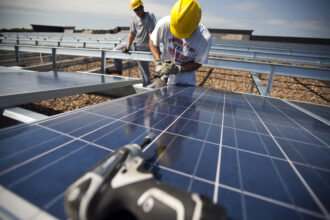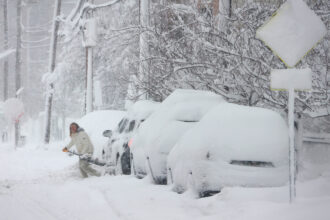China Nears Climate-Change Deal Over Fuel Efficiency (Bloomberg)
While China and India won’t support a treaty that caps their greenhouse gas emissions, they’ll probably agree to steps such as improving automobile fuel economy, raising the efficiency of power plants and installing wind turbines, experts say.
Research Finds Higher Acidity in Alaska Waters (AP)
Erosion threatens to topple coastal villages. Melting ice threatens polar bears. Now, a marine scientist says the state’s waters are turning acidic from absorbing greenhouse gases, potentially endangering Alaska’s $4.6 billion fishing industry.
Future Shock: Refiners’ Visions of Doom (Wall Street Journal)
Forget The Road, Nine and The Book of Eli. This year’s scariest dystopian tale comes from U.S. refiners, who see the push to curb carbon emissions, headed for the Senate, as the beginning of the end.
Alternative Energy Powerhouse Brazil Finds Big Oil (AP)
Brazil, long proud of its push to develop renewable energy and wean itself off oil, has a bad case of fossil-fuel fever after the discovery of an enormous offshore field.
Native Americans Joining London Tar Sands Protest (Guardian)
Members of Canada’s First Nations are joining the Climate Camp protests in London this week in an attempt to draw attention to corporate Britain’s "criminal" involvement in the tar sands of Canada.
Bay Area Utility Turns Food Scraps into Energy (Los Angeles Times)
Leftovers from San Francisco Bay Area restaurants may soon help power the region. The East Bay Municipal Utility District has created a program, believed to be the first of its kind in the nation, to generate electricity from the methane gas produced by food decomposition.
Africa Seeks Climate Change Cash (BBC)
The leaders of 10 African countries are gathering in Ethiopia to try to find a common position on climate change.
Calif. Utilities, Groups at Odds Over Renewable Energy (Sacramento Bee)
California’s utilities say they can’t meet the state’s 2020 goal of getting a third of their power from renewable sources without importing it from other states and even Canada. Labor and environment groups say the capacity should be built at home.
Second Denmark City Weighs Carbon-Neutral Target (Guardian)
Denmark’s second largest city will decide in September whether to finance a plan to become carbon-neutral by 2030. With Copenhagen, it would join only a handful of cities in the world to set such ambitious climate change targets.
Energy-Aware Internet Routing Could Help Cut Emissions (MIT Tech Review)
An Internet-routing algorithm that tracks electricity price fluctuations could save data-hungry companies such as Google, Microsoft, and Amazon millions of dollars each year in electricity costs, a study from MIT, Carnegie Mellon and Akamai suggests.
PHEV Li-ion Cells Hold Up With Combined Driving, V2G (Green Car Congress)
Carnegie Mellon’s Electricity Industry Center concludes that a PHEV pack comprising lithium iron phosphate cells would incur little capacity loss from combining vehicle-to-grid (V2G) activities with regular driving.
Wind Farm Debate Splits Property Owners in West (AP)
As the nation’s demand for renewable energy grows, landowners and governments across the West are wrestling with how to balance their cherished private property rights against the visual impact of 400-foot-tall wind turbines and the transmission lines.
About This Story
Perhaps you noticed: This story, like all the news we publish, is free to read. That’s because Inside Climate News is a 501c3 nonprofit organization. We do not charge a subscription fee, lock our news behind a paywall, or clutter our website with ads. We make our news on climate and the environment freely available to you and anyone who wants it.
That’s not all. We also share our news for free with scores of other media organizations around the country. Many of them can’t afford to do environmental journalism of their own. We’ve built bureaus from coast to coast to report local stories, collaborate with local newsrooms and co-publish articles so that this vital work is shared as widely as possible.
Two of us launched ICN in 2007. Six years later we earned a Pulitzer Prize for National Reporting, and now we run the oldest and largest dedicated climate newsroom in the nation. We tell the story in all its complexity. We hold polluters accountable. We expose environmental injustice. We debunk misinformation. We scrutinize solutions and inspire action.
Donations from readers like you fund every aspect of what we do. If you don’t already, will you support our ongoing work, our reporting on the biggest crisis facing our planet, and help us reach even more readers in more places?
Please take a moment to make a tax-deductible donation. Every one of them makes a difference.
Thank you,











